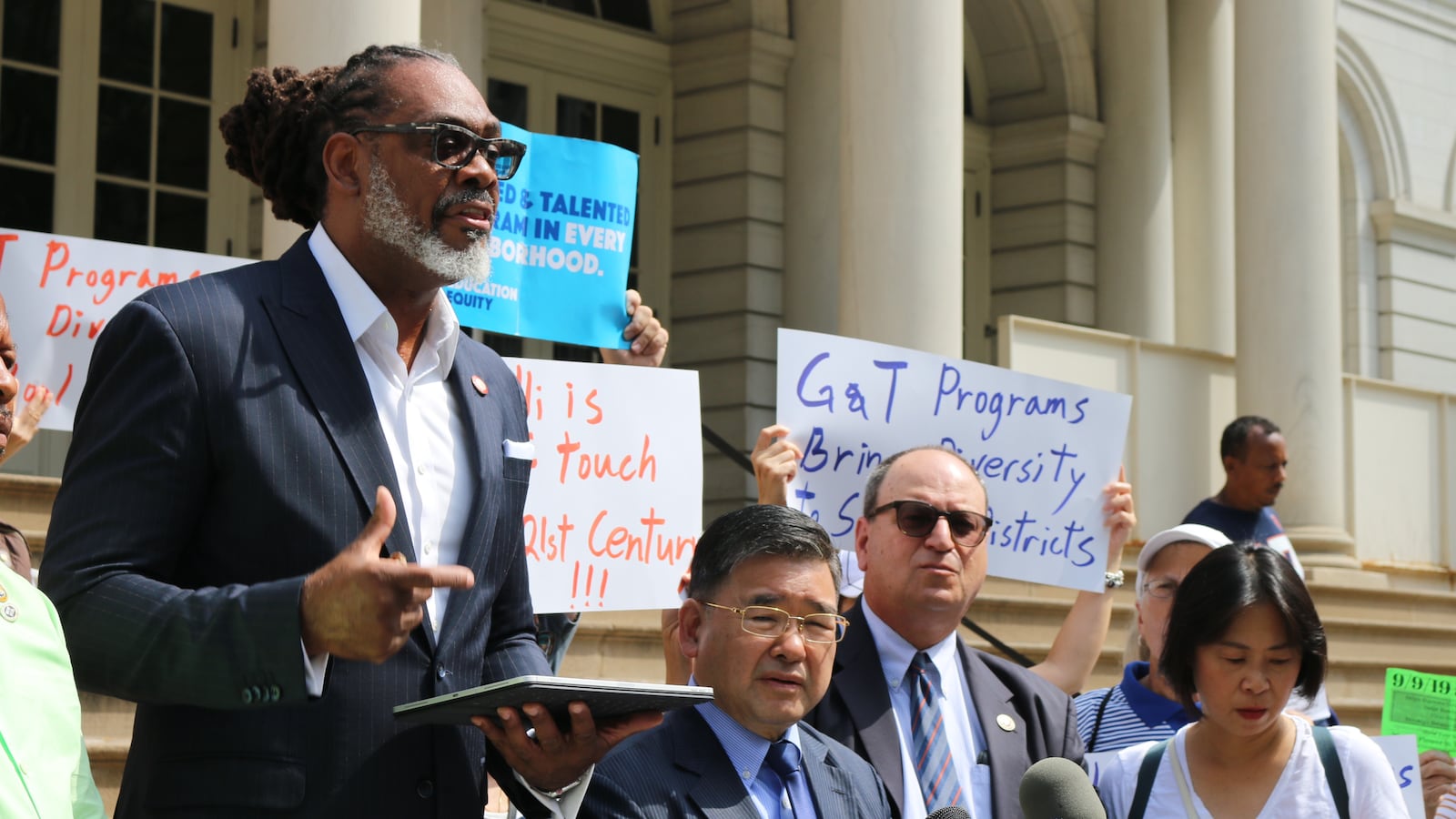Speaking from the steps of City Hall Wednesday, Councilman Robert Cornegy, Jr., shared a letter signed by 14 elected officials urging the city to preserve gifted and talented education as it currently stands. At the same time, he acknowledged opportunities to reform the way students are admitted to those programs.
“Rather than seeing the program as unjust, or an impediment to diversity in our schools, we see the program as a catalyst for helping children succeed, particularly students of color,” states the letter, which was presented at a press conference alongside councilmen from across Manhattan, Brooklyn, the Bronx, and Queens.
A committee appointed by Mayor Bill de Blasio last week proposed phasing out current gifted programs — just one of the non-binding recommendations issued by the School Diversity Advisory Group. The group’s proposals are aimed at encouraging more integration in one of the country’s most segregated school systems. Ultimately, it’s up to de Blasio whether to accept the group’s recommendations. He recently adopted much of what the group recommended in its initial February report.
Currently, admission for gifted programs is based on a single test, which children usually take when they’re 4-years-old, before entering kindergarten. The advisory group called on the city to eliminate the exam, saying admissions demand “robust resources” and “investments of both time and energy,” from families who prepare their children for the test and have the savvy to navigate the process.
The council members echoed their letter’s call for a new way to identify gifted students, saying the programs could be “yet more inclusive by considering factors beyond test scores.”
Gifted programs in New York City’s public schools are almost a reverse image of its enrollment numbers: less than a quarter of students are black or Hispanic, while those students make up almost 70% of students citywide.
Cornegy, who represents Brooklyn’s Bedford-Stuyvesant neighborhood, called the admissions test “implicitly biased,” which is why he previously helped lead a charge for new gifted programs that start in third grade, and rely on grades and teacher recommendations for admissions.
“Depending on whether you’re a second language learner, whether or not you come from parts of the community that the whole family is not educated, that could be a barrier to you doing well on that exam,” he said.
Of the six councilmen assembled, only Councilman Peter Koo said he could go “either way” when it comes to testing 4-year-olds for admission. His district spans Flushing, Queens, where many Asian and white students are currently enrolled in gifted programs.
Koo’s position highlights how closely the debate over gifted programs parallel a similarly explosive fight over the city’s specialized high schools. Just like elementary school gifted programs, a group of specialized high schools admit students based on the results of a single test (except for one performing arts school, which uses auditions.) Asian students make up a disproportionate share of students in gifted programs and the majority of students at the specialized schools. At Wednesday’s press conference, many of the parents assembled were Asian.
One area where the elected officials who signed onto the letter diverged sharply from the advisory group’s stance: what gifted programs should actually look like in the classroom. The advisory group calls for a move to school-wide enrichment models and magnet programs with admissions based on a lottery.
But council members Wednesday said the current approach, which isn’t standardized across the city, is working well for students who are able to access it — and that they don’t trust the education department to support such a shift quickly or properly.
“It’s a vote of no confidence for me on implementing this in any time frame that a parent could be satisfied with,” Cornegy said. “There is a program that works. Tweak that program as this utopian model comes into place.”
In a radio interview, Maya Wiley, a professor at The New School who helped lead the advisory group, responded to calls for an expansion of gifted programs by noting that the city should ramp up other approaches to challenging students.
“Call it whatever you want,” she told WNYC’s Brian Lehrer show. “What we should be willing to do is look at the program, not the label, and…not just be worried. Because we are in agreement.”
She also placed blame for the current state of segregation in gifted programs squarely on former Mayor Michael Bloomberg. During his tenure, the education department moved to the current test-based admissions models, which eventually led to the closure of gifted programs in communities of color where few students took the test or earned a qualifying score.
“What the Bloomberg era did for gifted and talented was essentially to shrink opportunity for kids,” Wiley said. “It actually accelerated segregation.”
Joel Klein, who served as schools chancellor for much of Bloomberg’s tenure, shot back on Twitter, calling the recommendation for eliminating gifted programs a “bone-headed proposal.”

